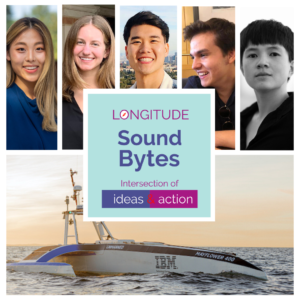
Longitude Sound Bytes
Ep 78: Longitudes of Imagination and MAS400 (Listen)
“We are embarking on a voyage of imagination.”
Jaena Kim
Welcome back to Longitude Sound Bytes, bringing innovative insights from around the world directly to you. This time we’re embarking on a voyage of imagination. I’m Jaena Kim, Longitude fellow and a law student at the University of Ottawa.
Jade McAdams
I’m Longitude fellow Jade McAdams, a mechanical engineering student at Rice University. Join us throughout November as we set sail behind the scenes with the shipmates of the Mayflower Autonomous Ship.
Tony Zhou
The Mayflower Autonomous Ship or MAS 400 is an ongoing story of collaboration and unpredictability, bringing together the best hands of IBM and ProMare on deck. I am Tony Zhou, a Longitude fellow and data scientist at Yale University.
Can Erdogan
But you won’t find anyone aboard the fully autonomous, AI powered marine research vessel. Find out how available imagination ripples into unchartered waters of innovative ocean research every Monday and Wednesday of this month. I’m Longitude fellow Can Erdogan, also an engineering student at Rice University.
Molly Turner
And this is Molly Turner, Longitude fellow and conducting fellow at the Colburn school in Los Angeles. Keep listening for a sneak preview of the upcoming Sound Bytes series: Longitudes of Imagination. Featuring Brett Phaneuf, Don Scott, Carrie Bendzsa, Andy Stanford Clark and Jonathan Batty.
.
Jaena
Did you know the United Nations has declared a decade of ocean science for sustainable development from 2021 to 2030? IBM’s Chief Technology Officer for the UK and Ireland, Andy Stanford Clark, wrote that we know more about the surface of Mars than we do about many parts of the ocean.
Andy Stanford Clark (CTO at IBM UK and Ireland)
The purpose of the ship is to explore the oceans and have experiments on board that will improve our understanding of the impact of climate change on the ocean, and also the effect of pollution of the ocean from humans. From that we plan to spend a long time at sea, gathering large amounts of data and use that to change our understanding of this not very well understood, massive resource. Half of our oxygen comes from the oceans. So as my colleague says, if you take two breaths, one of those breaths was generated by the ocean. We really do rely on the health of the ocean to continue to occupy this planet.
Can
Dr. Stanford Clark talks about harvesting literally an ocean of data impossible for a single person, but not a team. The interesting thing was that the project was initiated by volunteers. So everybody who was working on the project had a tremendous passion for ocean science and innovation.
Molly
Oceans regulate the world’s climate systems, and we rely on them for food, transportation and natural resources. But oceans are formidable places, with waves that can reach heights over 60 feet during storms and make research explorations at sea dangerous.
Fortunately, autonomous technologies hold promise for innovative new ways to increase safety in ocean traffic but also for collecting critical ocean data. Brett Phaneuf saw this potential.
Brett Phaneuf (Co-director of MAS400)
So we decided to build the Mayflower autonomous ship in 2016. And we really focused the first four or five years of our work on building infrastructure to collect data, as we know how to build boats. And so then the question is, what’s the hard part? The hard part, aside from the fact that boats break, and the ocean is probably the most challenging environment on the planet and it’s the preponderance of the planet, nonetheless, and also, arguably the most important part of the planet in terms of maintaining a living ecosystem and climate in general. It’s a really challenging place to be. So we said, you know, the AI is the hard part. So we got to start thinking about that. We have to have lots of data that we have to make into models.
Jade
The unpredictability of oceans requires meticulous engineering. Marine AI Chief Technology Officer Don Scott also believes in the value of a passionate team when pursuing a vision. Don personally feels most at home taking a blank piece of paper and creating a roadmap to reach a final product. But he emphasizes that projects need cross-disciplinary team members focused on a single goal to actually become a reality. He claims that Brett’s conception of the Mayflower is a prime example of that.
Don Scott (CTO at MarineAI)
He [Brett] had this idea, you know, this concept. It was in his head, and he was able to express it quite clearly but also motivate others to do that. It’s great to have an idea, but you actually need to build a team to actually make it happen. You need mechanical engineers, you need electrical engineers, you need software people and stuff like that.
Tony
The Mayflower 400, a commemoration to the 400th anniversary of the 1620 Mayflower ship, has developed into a compelling story in partnership between ProMare, an idea on how to advance ocean research and autonomous AI. In speaking with Brett, co-director of the Mayflower 400, this project has made him increasingly encouraged for humanity, and he hopes this project could be an example of how artificial intelligence can be harnessed for good.
Molly
Funnily enough, Brett was most surprised by how interested people have been in the project.
Brett Phaneuf (Co-director of MAS400)
The most unexpected thing was that this sort of autonomous vessel, this sort of spaceship looking boat, is very humanizing. And, you know, I got up in the middle of the night, once, when it was going out to sea, we’re like 400 miles offshore in the first attempt to cross, and I logged into the portal and this, like, 30,000 people logged in looking at the camera feed from the vessel. That’s been really unexpected. I’m really appreciative at the level of interest, but I’m still baffled by it.
Jaena
30,000 people! That’s 10,000 more people than can fit into Madison Square Garden. Can you believe the sharing of such a successful project was met with initial resistance for its potential for unpredictability at the beginning? IBM America’s US markets and regional communications leader Carrie Bendzsa gives us a bit of insight.
Carrie Bendzsa (U.S. Markets and Regional Communications leader at IBM)
At first, when I first brought it up, we were met with a bit of resistance I have to say, because people said, Well, let’s just wait till the ship makes its voyage. And then we’ll talk about it when it’s successful. But luckily, my colleague Jonathan was very like-minded and saw the potential and started to build a story from what this could be, the steps along the way and whatnot.
Molly
PR and technical teams sometimes come together in just the right way to share scientific endeavors with the world. I don’t think any project can embody that better than the MAS 400.
.
Jaena
This brings us to the end of our introductory episode.
Can
Luckily, this is not the end. It’s just the beginning of the new Sound Bytes series.
Jade
We can’t wait for you to tune into the first episode of Longitudes of Imagination.
Tony
Join me and Brett this coming Monday where we’ll chat about his vision for the MAS 400, ocean research, AI ethics and edge computing.
Jaena
Follow longitude on Facebook, Instagram and LinkedIn to make sure you don’t miss the release of the first Longitude of Imagination episode in collaboration with the Mayflower Autonomous Ship project and IBM. You can also visit our website Longitude dot Site, s i t e, for more information and content.

